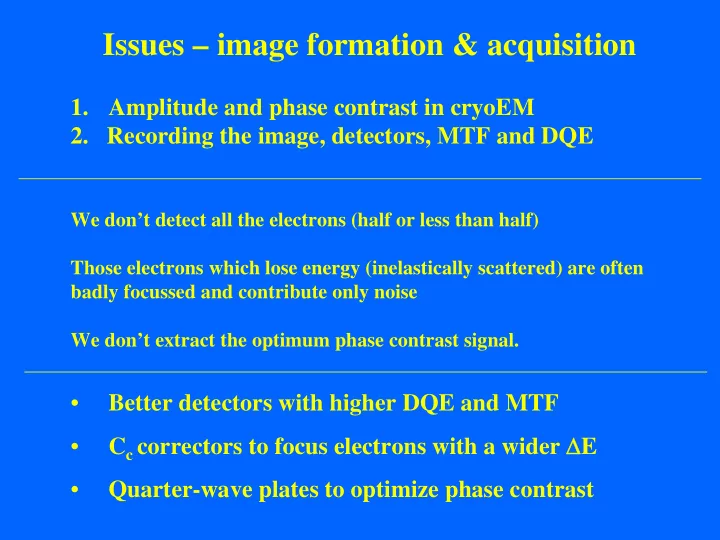

Issues – image formation & acquisition 1. Amplitude and phase contrast in cryoEM 2. Recording the image, detectors, MTF and DQE We don’t detect all the electrons (half or less than half) Those electrons which lose energy (inelastically scattered) are often badly focussed and contribute only noise We don’t extract the optimum phase contrast signal. Better detectors with higher DQE and MTF • C c correctors to focus electrons with a wider Δ E • Quarter-wave plates to optimize phase contrast •
Ultramicroscopy (1988) 25, 279-292 (at 120kV) See also Toyoshima et al, Ultramicroscopy (1993) 48, 165-176 120kV – 5.8% 200kV – 4.8%
Toyoshima & Unwin, Ultramicroscopy 1988
Understanding images of unstained biological molecules 100 keV electron scattering factors (IAM) η |f| per atom H 0.63 0.008 C 2.90 0.037 N 2.57 0.045 O 2.34 0.052 S 6.08 0.08 U 22 0.22
Some problems in understanding images of unstained biological molecules 100 keV electron scattering factors (IAM) η |f| per atom H 0.63 0.008 C 2.90 0.037 N 2.57 0.045 O 2.34 0.052 S 6.08 0.08 U 22 0.22
Embedding in ice Ratio of amplitude to phase contrast η (p-w) = (f p η p – f w η w )/(f p -f w ) = η p + (f w /(f p -f w )).( η p – η w )
| f|/mol η moles |f|/Å3 estimated density or /res /Å 3 “fudge” from used M.W. bonding (g/cc) H 2 O (ice) 18 3.6 0.033 0.12 0.036 0.13 0.03 1.0 protein (lo dose) 25.7 108.5 0.008 0.198 0.035 0.18 0.04 1.4 protein (hi dose) ~13 ~0.008 ~0.10 ~0.04 ~0.10 ~0.04 0.7 UA (lo dose) 376 48.7 0.0048 0.23 0.12 0.22 0.14 3.0 UA (hi dose) ~300 ~35 ~0.006 ~0.21 ~0.17 ~0.21 ~0.17 3.0 UA - prot (lo dose) - - 0.032 0.64 0.05 0.48 - UA - prot (hi dose) - - ~0.11 ~0.27 ~0.11 ~0.27 - prot - ice - - 0.08 0.035 0.05 0.066 Note: for high dose images of negatively stained specimens, a 50% mass loss of organic matter has been assumed compared with low does images.
Detectors for Electron Microscopy Film (SO-163) Phosphor/Fibre Optics/cooled CCD Phosphor/Lens/cooled CCD Hybrid Pixel Detectors (Medipix) Monolithic Active Pixel Sensors (MAPS/CMOS)
Monte Carlo simulation of electron trajectories in silicon Detector thickness = 300 microns, pixel=55 microns Extension of simulations to include energy deposition (GM)
Backscattering test – film loaded upside down above test materials Optical Density Vacuum 1.00 Beryllium 1.13 Plastic film 1.19 Aluminium 1.35 Silicon 1.38 Copper 1.55
Gatan Ultrascan 4000
Gatan US4000 Gatan US4000 SO-163 film SO-163 film CCD better film better ---> Gatan US4000 CCD camera versus Kodak SO-163 film for 200keV electrons from Booth et al (2004) JSB, 147 , 116-127.
Medipix 2
or electron gun MediPix 2 hybrid pixel or electrons sensor Campbell et al at CERN
(Silicon/CdTe) Single pixel schematic
Medipix 2 - grid shadow Image of grid with 18 electrons/pixel Image with < 0.01 electron/pixel No counts are recorded in areas not Electrons are almost all recorded in exposed to incident electrons one pixel
Medipix 2 - raster of spots Mean Intensity 111 Mean Intensity 4.7 Std Deviation 11 Std Deviation 1.8 Film exposure equivalent to above Mean Intensity 116 spots not visible, unmeasurable Std Deviation 24
120keV electrons/45keV threshold 300keV electrons/80keV threshold
120keV electrons; a-c Δ E=80keV, a-g 40keV, a-j 20keV, a-n >0.5%, o - rare
Resolution of Quad_Medipix2 from 120 – 300 keV 300 mesh grid, spacing ~650 microns in image
Cs137 β low (scale 0-5) Cs137 β med Cs137 β high 10 sec blank 30 minute cosmics 800 el/pixel shadow
McMullan et al, Ultramicroscopy (2007) 107, 401-413) Some DQE formulae DQE(0) = (S/N out ) 2 / (S/N in ) 2 - any detector DQE(0) = ( Σ ip i ) 2 / ( Σ i 2 p i ) - digital detector (where pi is probablility of recording a single incident electron in i pixels) DQE( ω ) = DQE(0) . MTF( ω ) 2 / NTF( ω ) 2
MAPS/CMOS in 35mm port on CM12
MAPS CMOS Detector • no bias voltages - charged particles • charge diffusion • 100% fill factor Turchetta et al NIM A458 (2001) 677-689
MAPS CMOS detector
MTF at Nyquist limit (% of maximum = 2/ π ) # pixels Detector Energy Noise MTF pixel size on edge 50% 7 μ m SO-163 film 120keV ~ 4 12000 <10% 15 μ m Gatan US4000 200keV 0.8 4000 25% 24 μ m Tietz 224 200keV 0.3 2000 24% 24 μ m 300keV 0.5 2000 25% 24 μ m Tietz 224 HD 120keV 0.06 2000 24% 24 μ m Tietz 224 HD* 300keV 0.1 2000 25 μ m MAPS/CMOS 120keV 0.05 52% 525 15 μ m HEPAPS-2 300keV 0.08 - 525 25 μ m SIRA Star250 300keV 0.2 - 512 120keV 0.000001 50% 55 μ m Medipix2 256 * = extrapolated
Detectors – Medipix & CMOS David Cattermole Greg McMullan Wasi Faruqi
Recommend
More recommend